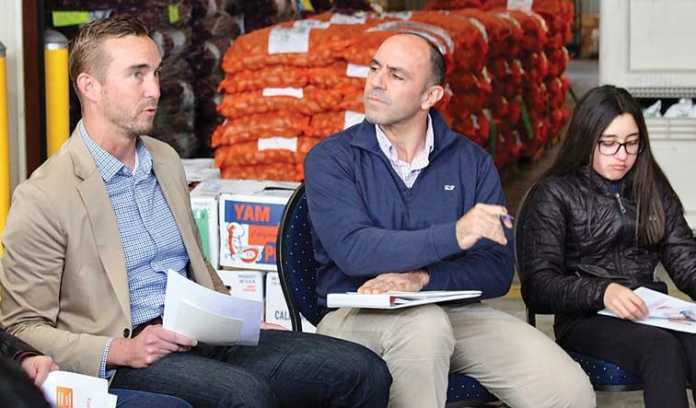WATSONVILLE — On Jan. 25, President Donald Trump announced a short-term deal to end the partial government shutdown which began on Dec. 22.
But recovering from the shutdown — the longest in U.S. history — will take time and effort, said Congressman Jimmy Panetta on Saturday during his visit to Second Harvest Food Bank in Watsonville.
Panetta, along with Second Harvest staff, city officials, community members, representatives from County Health and Human Services and the California Association of Food Banks, came together to discuss how the shutdown affects residents’ access to food.
“This [shutdown] is about more than just employees not getting paid,” Panetta said. “It’s had a ripple effect, hitting everything from national security, to the economy, the Coast Guard, and of course, our food.”
Joel Campos, director of community outreach at Second Harvest, agreed.
“I’ve worked here for 15 years and I have never seen anything like this,” Campos said. “It’s taken a toll on our resources, and eroded people’s confidence that their safety net will still be there.”
Among the many topics brought up at Saturday’s meeting was the U.S. Department of Agriculture’s decision to issue participants of the Supplemental Nutrition Assistance Program (SNAP) their February benefits early.
Many people, such as local resident Fidela Curiel, were not notified directly and as such were confused when they received assistance twice in one month.
“I didn’t know what was going on,” Curiel said. “We didn’t know if it was an extra benefit, or if it would run out earlier.”
Curiel, a Cabrillo College student and a mother, said she relies a great deal on the support from the SNAP program, also known as CalFresh.
“I’m grateful for the advance, I just wish I had known,” she said.

Fidela Curiel (left) explains to Congressman Jimmy Panetta about how the recent government shutdown affected her CalFresh benefits. (Photo by Johanna Miller/Pajaronian)
Second Harvest Chief Executive Officer Willy Elliott-McCrea acknowledged Curiel and other residents’ concerns, admitting that due to how quickly the USDA’s decision had been made, it was difficult for organizations such as Second Harvest to get the word out. He urged everyone at Saturday’s meeting to spread the word that Second Harvest is a source for information as well as food.
“We want to make sure people know we’re still here,” he said. “We can help out. Don’t hesitate to contact us.”
Throughout the meeting, Watsonville city officials took turns in thanking Panetta for the visit and addressing their own concerns and ideas regarding the shutdown. Community members and organizers attending the meeting asked Panetta what they could do to give support during the recovery period.
Panetta praised the Watsonville community for their resolve.
“During these uncertain times, the most progress is made not at a federal level, but at places like Second Harvest,” Panetta said. “That’s what gives me hope.”
Panetta said he was thrilled that the government was open once again, calling it “long overdue,” but warned that it wasn’t quite over yet.
“We have a long way to go,” he said. “But if we work hard together we will find solutions. I’m optimistic about the future because of people like you.”














